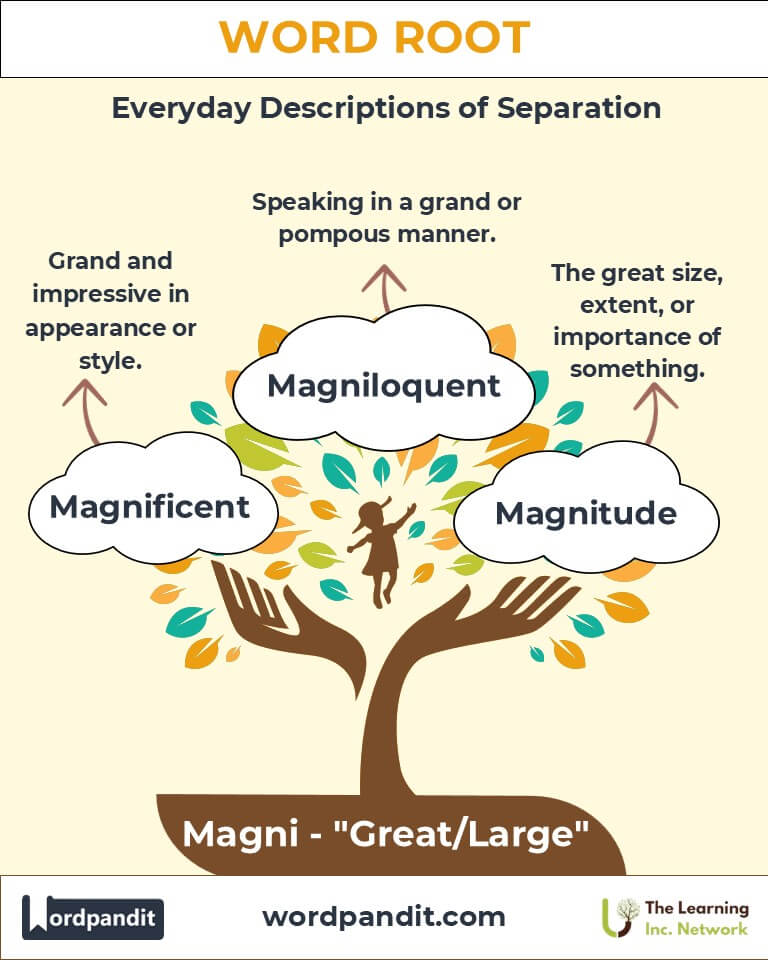Magni: The Language of Greatness and Magnitude in Words and Fields
Explore the origins, meanings, and applications of the word root "Magni," encompassing greatness, magnitude, and magnificence. This article unpacks the influence of "Magni" across science, art, and everyday expressions, showing how this root has shaped languages and disciplines.

Table of Contents
- Introduction: Magnifying the Power of "Magni"
- Etymology and Historical Journey
- Mnemonic: Unlocking the Power of "Magni"
- Common Magni-Related Terms
- "Magni" Through Time
- "Magni" in Specialized Fields
- Illustrative Story: "Magni" in Action
- Cultural Significance of the Word Root "Magni"
- The "Magni" Family Tree
- FAQs About the "Magni" Word Root
- Test Your Knowledge: "Magni" Mastery Quiz
- Conclusion: The Enduring Legacy of "Magni"
1. Introduction: Magnifying the Power of "Magni"
Did you ever wonder why we call certain objects "magnificent" or why we "magnify" small details? The root "Magni," derived from the Latin word magnus, meaning "great" or "large," holds the key. Pronounced "mag-nee," this root captures concepts of greatness, size, or importance across various domains, from scientific terms like "magnitude" to artistic expressions of "magnificence." Join us in uncovering how "Magni" resonates through history, science, and daily language.

2. Etymology and Historical Journey
The Latin root magnus—meaning "great" or "large"—has been a cornerstone of Western linguistic traditions. Its influence spread through the Roman Empire, shaping words in Romance languages like Italian (magnifico), French (magnifique), and Spanish (magnífico). The root's adoption into English during the Norman conquest cemented its presence in descriptions of greatness or superiority, from monarchial titles like "Magnate" to the scientific measure of earthquakes' strength, "magnitude."
One historical figure exemplifying "Magni" is Alexander the Great, whose epithet in Latin translations often incorporated magnus, reflecting his unmatched influence and conquests.
3. Mnemonic: Unlocking the Power of "Magni"
Picture a giant magnifying glass zooming in on the grandeur of the universe—planets, stars, and galaxies. This visualization links the idea of "Magni" to the concept of greatness, whether in scale, importance, or brilliance.
Mnemonic Device: "Magni means mighty, majestic, and magnificent. Think of the magnifying glass that enlarges greatness!"
4. Common Magni-Related Terms
- Magnify (mag-nih-fy): To make something appear larger or more important.
Example: "Microscopes magnify tiny cells, revealing their intricate structures." - Magnitude (mag-nih-tood): Greatness in size, extent, or importance.
Example: "The magnitude of the earthquake was recorded as 7.8 on the Richter scale." - Magnificent (mag-nif-uh-sent): Impressively beautiful, elaborate, or great.
Example: "The palace was a magnificent testament to Renaissance architecture." - Magnanimous (mag-nan-uh-muss): Generous or noble in spirit.
Example: "His magnanimous gesture of forgiveness inspired everyone." - Magnet (mag-net): A material or object that produces a magnetic field.
Example: "Magnets are essential in generating electricity."
5. "Magni" Through Time
- Magnus: Originally Latin for "great," its usage evolved to titles like "Magnate," referring to a wealthy or influential person.
Modern Use: Refers to individuals with significant influence in fields like industry or politics. - Magnitude: Initially used to describe physical size, it later gained prominence in science, particularly in astronomy and seismology.
Evolution: From describing celestial distances to quantifying earthquakes' strength.
6. "Magni" in Specialized Fields
- Astronomy:
Magnitude: Measures a celestial object's brightness.
Real-world Application: Understanding star visibility and their distances from Earth. - Seismology:
Magnitude Scale: Quantifies the energy released during earthquakes.
Importance: Enables disaster preparedness and response planning. - Medicine:
Magnification Devices: Instruments like magnifying lenses and microscopes revolutionized diagnostics.
Modern Impact: Facilitates precision in surgeries and scientific research. - Art and Literature:
Magnificence: Used to describe works of grand scale or beauty.
Cultural Role: Highlights humanity's admiration for the extraordinary. - Physics:
Magnetism: Studies of magnetic fields, critical in engineering and technology.
Applications: Found in everything from compasses to MRI machines.
7. Illustrative Story: "Magni" in Action
Dr. Celeste Magnus, an esteemed seismologist, was tasked with assessing a series of minor tremors near a densely populated region. Using her expertise in the magnitude scale and advanced seismic tools, she discovered that the tremors were precursors to a potential earthquake. Her swift action in alerting local authorities enabled emergency measures, saving countless lives. Her name, fittingly tied to the root "Magni," reflected her great contribution to society.
8. Cultural Significance of the Word Root "Magni"
The theme of greatness inherent in "Magni" resonates universally. From architectural marvels like the Taj Mahal to influential leaders such as Charlemagne (Charles the Great), "Magni" embodies human aspirations for excellence. Its usage in titles, such as "Your Magnificence," reflects the respect and reverence for unparalleled achievements.

9. The "Magni" Family Tree
- Max (Latin maximus):
Greatest.
Example: Maximize: To make as large or effective as possible.
Example: "Maximize your potential by focusing on strengths." - Mega (Greek megas):
Large or great.
Example: Megastar: A widely acclaimed celebrity.
Example: "The megastar's concert drew millions." - Grand (Latin grandis):
Large or impressive.
Example: Grandiose: Impressive but pretentious or exaggerated.
Example: "His grandiose plans lacked feasibility."
FAQs About the Magni Word Root
Q: What does the root "Magni" signify?
A: The root "Magni" signifies "greatness" or "largeness." Derived from Latin magnus, it encompasses concepts of importance, size, power, or nobility. This root is used to describe both physical magnitude (e.g., "magnitude") and figurative greatness (e.g., "magnanimous").
Q: How is "Magni" used in everyday language?
A: Words like "magnify" and "magnificent" are common examples. "Magnify" means to enlarge or emphasize, while "magnificent" describes something grand or impressive. Both demonstrate the root's connection to greatness or enhancement.
Q: Is "Magnet" related to "Magni"?
A: Yes, indirectly. The term "magnet" involves the idea of powerful attraction or force, resonating with the theme of greatness or strength inherent in "Magni."
Q: How does "magnitude" differ in astronomy and seismology?
A: In astronomy, "magnitude" refers to the brightness of celestial objects, with lower numbers indicating brighter stars. In seismology, it quantifies the energy released by an earthquake, measured on a logarithmic scale.
Q: What does "magnanimous" mean in modern usage?
A: It describes someone who is noble, generous, and forgiving, especially toward a rival or someone less powerful. The word reflects inner greatness and moral superiority.
Q: What is the significance of "Magni" in science?
A: In science, "Magni" plays a role in concepts like "magnitude" in physics and seismology, and "magnification" in optics. It highlights the measurement or emphasis of greatness, scale, or detail.
Q: Are there cultural references tied to "Magni"?
A: Yes, historical figures like Charlemagne ("Charles the Great") or Alexander the Great carry the "Magni" theme in their titles, emphasizing their influence. Similarly, magnificent architecture or art reflects societal aspirations for greatness.
Q: Does "Magni" only refer to size?
A: No, "Magni" also refers to figurative greatness, such as importance or moral superiority. For example, "magnify" can mean to emphasize, not just enlarge.
Test Your Knowledge: Magni Word Root Quiz
1. What does "Magni" mean?
2. Which device magnifies objects?
3. What is a "magnanimous" person known for?
4. What does "magnitude" measure in earthquakes?
5. Which field uses "magnitude" to study brightness?
12. Conclusion: The Enduring Legacy of "Magni"
The root "Magni" encapsulates the pursuit of greatness, whether in science, art, or language. Its influence across disciplines highlights humanity's endless fascination with the grand and the remarkable. As we advance in understanding and innovation, "Magni" will continue to inspire new discoveries and expressions of magnificence.















Good site